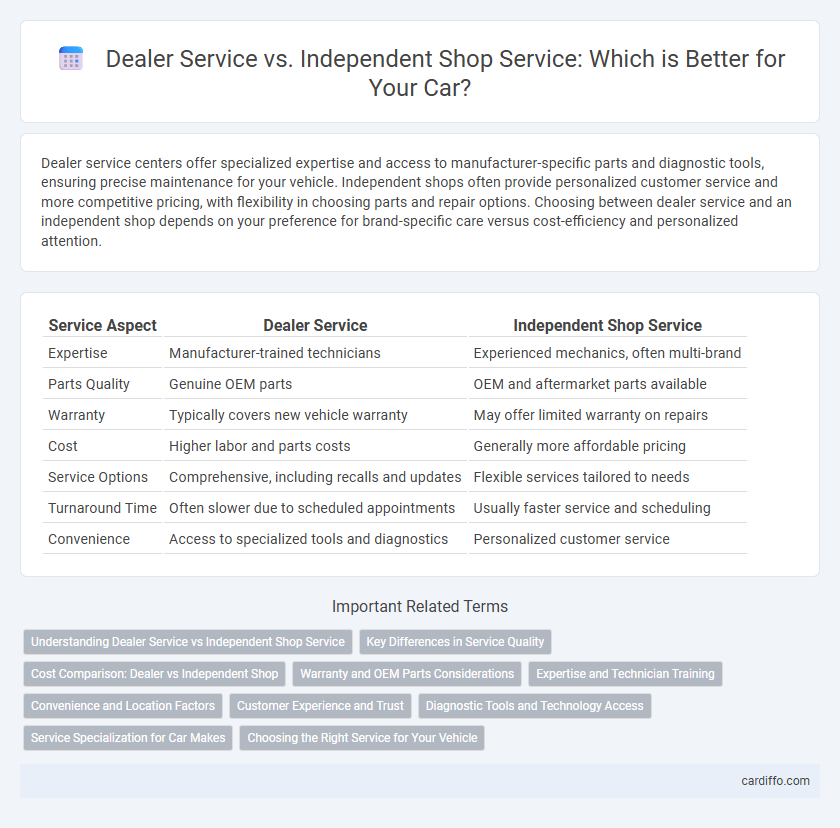Dealer service centers offer specialized expertise and access to manufacturer-specific parts and diagnostic tools, ensuring precise maintenance for your vehicle. Independent shops often provide personalized customer service and more competitive pricing, with flexibility in choosing parts and repair options. Choosing between dealer service and an independent shop depends on your preference for brand-specific care versus cost-efficiency and personalized attention.
Table of Comparison
| Service Aspect | Dealer Service | Independent Shop Service |
|---|---|---|
| Expertise | Manufacturer-trained technicians | Experienced mechanics, often multi-brand |
| Parts Quality | Genuine OEM parts | OEM and aftermarket parts available |
| Warranty | Typically covers new vehicle warranty | May offer limited warranty on repairs |
| Cost | Higher labor and parts costs | Generally more affordable pricing |
| Service Options | Comprehensive, including recalls and updates | Flexible services tailored to needs |
| Turnaround Time | Often slower due to scheduled appointments | Usually faster service and scheduling |
| Convenience | Access to specialized tools and diagnostics | Personalized customer service |
Understanding Dealer Service vs Independent Shop Service
Dealer service centers often provide manufacturer-certified technicians, genuine parts, and warranty-covered repairs, ensuring high-quality maintenance aligned with the vehicle brand. Independent shops offer more affordable labor rates, flexible scheduling, and a broad range of expertise on various vehicle makes and models, appealing to cost-conscious consumers. Understanding the differences in service quality, pricing, and warranty implications helps car owners make informed decisions about where to maintain their vehicles.
Key Differences in Service Quality
Dealer service centers utilize manufacturer-trained technicians and genuine OEM parts, ensuring precise diagnostics and adherence to warranty requirements. Independent shops often offer lower labor rates and personalized customer service but may vary in expertise and use aftermarket parts. The key difference lies in dealer service's consistent quality control and access to proprietary tools versus the flexibility and cost-effectiveness of independent shops.
Cost Comparison: Dealer vs Independent Shop
Dealer service typically incurs higher costs due to specialized equipment, manufacturer-trained technicians, and genuine parts, ensuring warranty compliance and quality assurance. Independent shops often provide more affordable pricing by using aftermarket parts and flexible labor rates, appealing to budget-conscious vehicle owners. Customers must weigh cost savings against potential differences in warranty support and expertise when choosing between dealer service and independent shops.
Warranty and OEM Parts Considerations
Dealer service centers often provide warranty coverage and use OEM parts, ensuring vehicle integrity and compliance with manufacturer standards. Independent shops may offer cost savings but could risk voiding warranties if non-OEM parts are installed or unauthorized repairs are performed. Understanding warranty terms and the importance of OEM parts is crucial for maintaining vehicle value and reliability.
Expertise and Technician Training
Dealer service centers employ technicians with specialized training directly from vehicle manufacturers, ensuring up-to-date knowledge on specific makes and models. Independent shops may have versatile expertise but often lack manufacturer-certified training programs critical for diagnosing complex, brand-specific issues. This manufacturer-backed training at dealer services enhances diagnostic accuracy and repair quality, particularly for advanced vehicle systems.
Convenience and Location Factors
Dealer service centers often provide convenience through brand-specific expertise and comprehensive warranty coverage, making them ideal for newer vehicles under manufacturer plans. Independent shops typically offer greater flexibility in location and operating hours, catering to immediate or local needs with potentially shorter wait times. Choosing between dealer service and independent repair depends largely on the proximity to authorized centers versus neighborhood garages and the importance of specialized diagnostics for the vehicle.
Customer Experience and Trust
Dealer service centers often provide specialized expertise, manufacturer-certified parts, and warranty-covered repairs, enhancing customer trust through guaranteed quality and reliability. Independent shops may offer personalized service, lower costs, and more flexibility in repair options, appealing to customers seeking affordability and a tailored experience. The decision between dealer and independent service hinges on the customer's priorities for trusted brand assurance versus cost-effective, customized care.
Diagnostic Tools and Technology Access
Dealer service centers utilize manufacturer-specific diagnostic tools and advanced technology directly linked to the vehicle's make, allowing for precise fault detection and efficient repairs. Independent shops often rely on universal scan tools that cover multiple brands but may lack access to proprietary software updates and technical bulletins critical for complex diagnostics. Access to OEM-level technology in dealer services ensures accurate diagnostics, faster troubleshooting, and compliance with warranty requirements, optimizing overall vehicle performance and reliability.
Service Specialization for Car Makes
Dealer service centers specialize in specific car makes, offering expertise, original parts, and manufacturer-approved repair techniques that ensure optimal vehicle performance and warranty integrity. Independent shops provide broader service options, often catering to multiple car brands with competitive pricing but may lack in-depth specialization or access to proprietary diagnostic tools. Choosing dealer service guarantees brand-specific knowledge, while independent shops offer flexibility and cost-effectiveness for diverse vehicle needs.
Choosing the Right Service for Your Vehicle
Dealer service offers manufacturer-trained technicians and genuine parts tailored to your specific vehicle model, ensuring warranty compliance and optimized performance. Independent shop service provides cost-effective repairs with personalized customer care, often excelling in general maintenance and older car models. Evaluating factors such as warranty status, service complexity, and budget helps determine the most suitable option for your vehicle's needs.
Dealer Service vs Independent Shop Service Infographic

 cardiffo.com
cardiffo.com